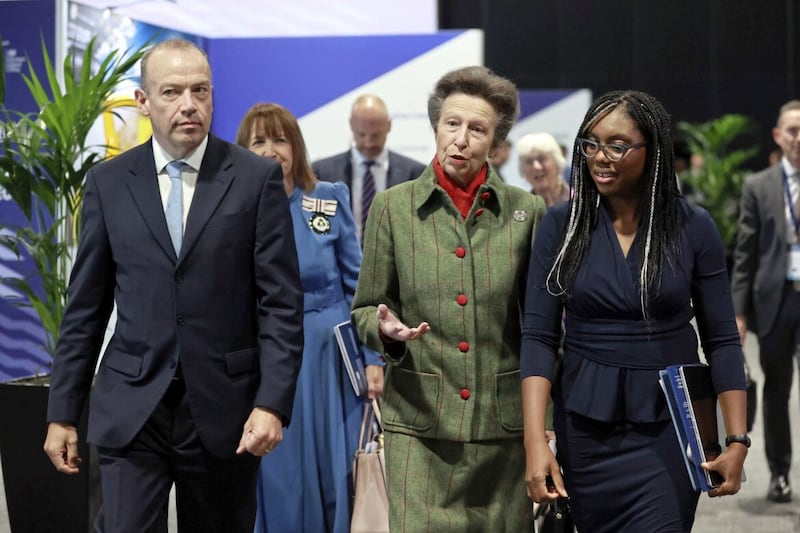THE world of work hasn’t just changed because of the pandemic. An ageing workforce, new technology, shifting perspectives on work-life balance, and an increased number of people dropping out of the workforce due to health problems or to manage caring responsibilities.
It all adds up to a whole new employment landscape, and one that compels each of us to really re-evaluate our approach to people and skills. For government, that means better calibrating the education and skills system to real world demand.
In Northern Ireland, it also means asking searching questions about whether our higher and further education sectors are being allocated the level of funding they need. Universities and colleges are absolutely vital to bringing through the talent that will allow us to compete in an increasingly competitive global labour market.
Reported cuts to college budgets are a significant concern to local firms, with business leaders clear that their worries extend beyond their own bottom line. The impact on Northern Ireland’s overall competitiveness could be significant, just as we urgently need to boost levels of investment.
While it’s well known that successful universities are central to any thriving economy, the role that further education plays in shaping the lives of young people – many of whom thrive in more practical and vocational pathways – is often overlooked.
Colleges provide employability skills to a significant proportion of the population, particularly those from more socially deprived backgrounds, and are critical to social mobility and economic inclusivity goals. Without adequate higher and further education funding our ambitions to provide life-long learning opportunities across our workforce will be severely curtailed.
For businesses, the new employment landscape means adapting to new working practices.??Whatever size of business or sector you operate in, access to people and skills is going to present a challenge in one way or another. According to the Bank of England, the UK’s labour supply will barely grow at all by the middle of this decade.
That’s particularly true in Northern Ireland, where we also face an acute demographic challenge. Growth in the local working-age population has virtually come to a standstill and, more worryingly, research show shows that it is only projected to increase by 0.2 per cent between mid-2020 and mid-2045.
The UK is also suffering from high levels of economic inactivity, with 1.7 million people wanting to work but facing barriers, including sickness, caring and childcare responsibilities, which mean they can’t. Over the last 15 years, economic inactivity in NI has been consistently higher than the UK average. Here, the current rate of economically inactive is 26.6 per cent; the highest out of all 12 UK regions and a full 5.1 per cent above the UK average.
There’s no understating the size and scale of this challenge – it’s one raised by CBI members every day. We’re not looking at a small issue that can be left to overworked HR departments, it’s a pretty seismic shift that impacts every firms’ ability to grow and invest. That in turn puts a handbrake on the whole economy.
?
Ahead of Wednesday’s Spring Budget, the CBI has called for action to boost affordable childcare provision; support employer health interventions - by extending the expenses and benefits system; and change the Apprenticeship Levy into something that works better for business. But we recognise that will take time.
But for many firms, that’s time they just don’t have, with shortages that are both immediate and acute. So, it’s now time to look at the immigration system – something we recognise isn’t politically straightforward for the government. At a meeting just last week, local business leaders – including CEOs – told us about the urgent need to reform the way that the Shortage Occupation List currently works. They’re desperate for a more flexible approach that is more in tune with the region’s urgent skill needs.
That’s why the CBI are so keen to see joined-up thinking on the economy’s people and skills requirements. Getting government departments to work together to determine a single approach would really help in delivering practical solutions that can work now and lay the groundwork for the future.
?
From a business point of view, we need to get serious about flexibility. Not just in terms of where we work, but how we work. Flexibility is increasingly a deciding factor when applying for jobs. Firms that say they offer it are clearly winning the race for talent. Flexibility also means being relentless in how we approach upskilling and retraining. Employers must think differently about the skills they already have in their organisation, finding new places to look for talent, and challenging themselves about why that talent would want to work with them are also key.
We really are at a crux moment on people and skills. We can’t keep doing the same things and expecting different results. The sooner government and business step up, the sooner we’ll reduce skills and inflationary pressure, increase productivity growth and deliver prosperity for all.
:: Angela McGowan is director of CBI Northern Ireland







